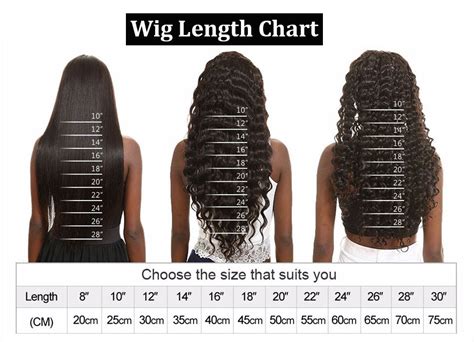Skip to content

Short Wigs (0-8 inches)
- Pixie Cut (0-2 inches): Ultra-short, boyish cut that frames the face.
- Bob (4-6 inches): Classic haircut that hits at the jawline, versatile for styling.
- Lob (6-8 inches): Longer version of a bob, reaching just below the shoulders.
Medium Wigs (10-14 inches)
- Shoulder Length (10-12 inches): Falls just below the shoulders, providing a natural and elegant look.
- Mid-Back (12-14 inches): Extends to the middle of the back, offering plenty of volume and styling options.
Long Wigs (16-22 inches)
- Bra Strap Length (16-18 inches): Falls just below the bra strap, creating a feminine and alluring silhouette.
- Waist Length (18-20 inches): Extends to the waist, providing maximum length and drama.
- Tailbone Length (20-22 inches): Reaches the tailbone, offering the ultimate in coverage and glamour.
Extra Long Wigs (24+ inches)
- Hip Length (24-26 inches): Falls just below the hips, creating a statement-making look.
- Thigh Length (26-28 inches): Extends to the thighs, providing an ultra-dramatic and voluminous effect.
- Floor Length (28+ inches): Reaches the floor, creating a truly show-stopping appearance.
How to Choose the Right Wig Length
- Face Shape: Short wigs can enhance narrow or angular faces, while medium to long wigs suit round or oval faces.
- Height and Body Type: Petite individuals may prefer shorter wigs, while taller or fuller-figured individuals can carry longer wigs with grace.
- Personal Style: Choose a wig length that complements your personality and wardrobe. Consider your desired look, from natural to glamorous.
Benefits of Wearing Wigs
- Instant Hairstyle Transformation: Change your hair length, color, and texture instantly without damaging your natural hair.
- Protective Styling: Wigs can protect natural hair from heat, chemicals, and environmental factors.
- Convenience: Wigs are easy to style and maintain, saving time and effort compared to natural hair care.
Tips and Tricks for Wearing Wigs
- Use a Wig Cap: Wear a wig cap to protect your natural hair and prevent slipping.
- Secure the Wig: Use hair pins or wig tape to keep the wig securely in place.
- Comb and Style: Brush the wig regularly and style it as desired using heated tools or hairspray.
- Avoid Over-Washing: Wigs only need to be washed occasionally, depending on usage and care instructions.
Common Mistakes to Avoid
- Buying a Wig That’s Too Small: A tight wig can be uncomfortable and cause hair damage.
- Storing Wigs Incorrectly: Store wigs on a wig head or mannequin to prevent tangling and damage.
- Over-Styling: Heat styling can damage wigs, so use protective sprays and avoid excessive use.
- Not Consulting a Professional: If you’re unsure about wig selection or styling, consult a hairstylist who specializes in wigs.
